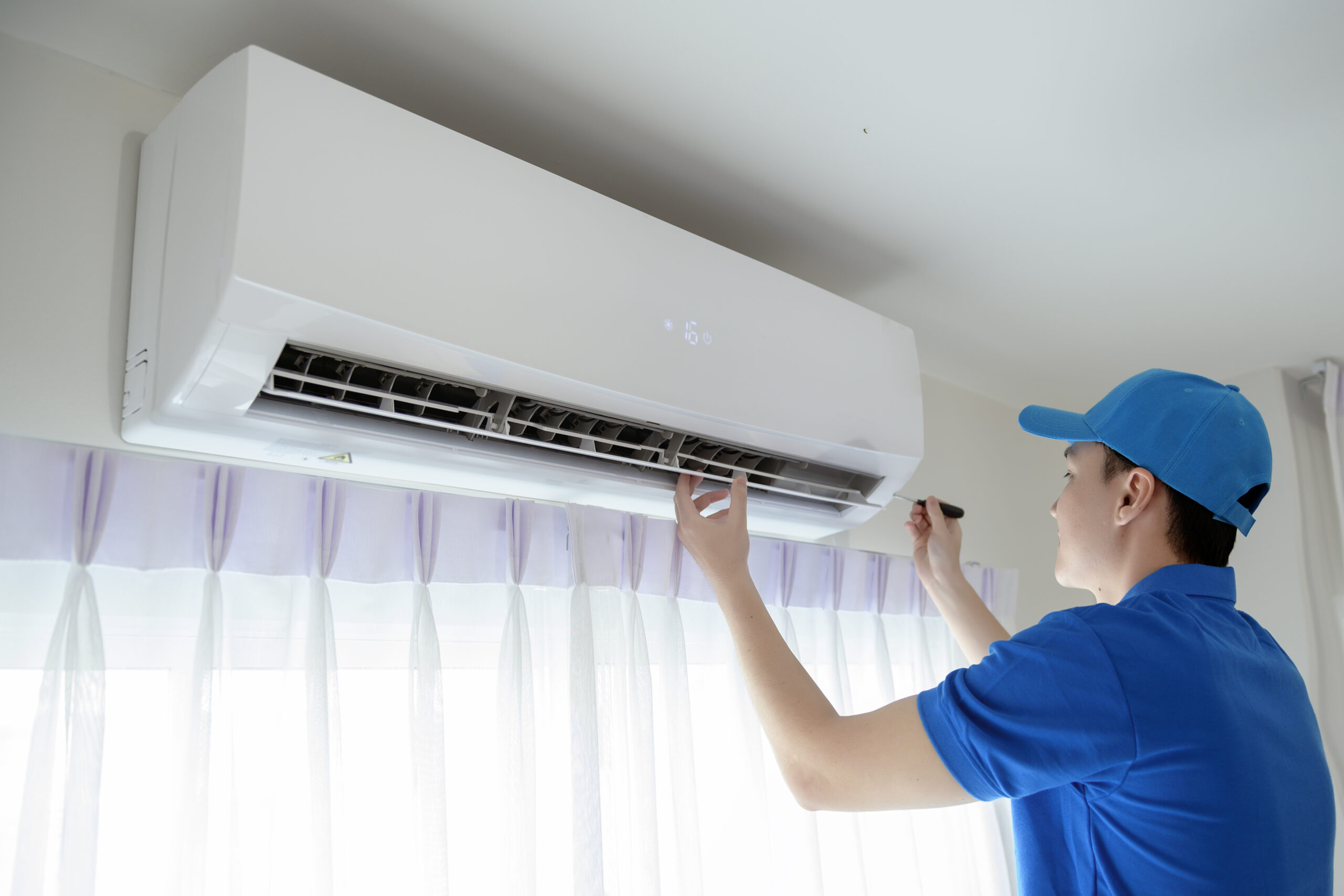Blog
The Hidden Dangers of a Dirty Aircon & Why You Should Clean It Regularly

The Hidden Dangers of a Dirty Aircon & Why You Should Clean It Regularly
When was the last time you cleaned your aircon? Many homeowners and business owners underestimate the importance of regular aircon cleaning, but a dirty air conditioner can pose serious risks beyond just reduced cooling efficiency. From health hazards to increased electricity bills, neglecting your aircon can lead to problems you may not even be aware of.
In this article, we’ll explore the hidden dangers of a dirty aircon and why regular cleaning is essential for your comfort, health, and savings.
Poor Air Quality & Health Issues
One of the biggest risks of an unclean aircon is the impact on indoor air quality. Over time, dust, dirt, mold, and bacteria accumulate inside the aircon unit, which gets blown into your home every time you turn it on. This can cause:
- Respiratory Issues – Dust and allergens can trigger asthma, sinus problems, and respiratory infections.
- Skin Irritations – Airborne bacteria and mold can lead to skin allergies and rashes.
- Weakened Immune System – Continuous exposure to bacteria-filled air can make you more susceptible to illnesses.
- Unpleasant Odors – A musty or sour smell from your aircon is a sign of mold and bacterial growth.
Solution: Schedule regular aircon cleaning to keep the air fresh and healthy for you and your family.
Reduced Cooling Efficiency
A dirty aircon has to work harder to cool your space. When the filters, evaporator coils, and condenser coils are clogged with dust and grime, the airflow is restricted, leading to:
- Longer Cooling Time – Your room takes longer to reach the desired temperature.
- Uneven Cooling – Some areas remain warm while others are too cold.
- Increased Energy Consumption – Your aircon uses more electricity, raising your monthly bills.
Solution: Regular cleaning ensures proper airflow and helps your aircon cool efficiently while reducing energy costs.
Higher Electricity Bills
Did you know that a dirty aircon can increase your electricity bill by up to 30%? When the components are clogged, the system has to work harder, consuming more energy. This inefficiency leads to:
- Wasted Electricity – Your aircon runs longer than necessary.
- Overworked Compressor – The compressor struggles to maintain cooling, increasing power usage.
- Expensive Repairs – Over time, the stress on your aircon can lead to costly breakdowns.
Solution: Cleaning your aircon ensures it runs smoothly and keeps your electricity bills under control.
Water Leaks & Mold Growth
One common issue with dirty aircon units is water leakage. When the drainage pipes are clogged with dirt and mold, water cannot flow properly, leading to leaks and moisture buildup. This creates the perfect environment for mold to grow, which can:
- Damage Your Walls & Ceiling – Water stains and mold patches appear on walls and furniture.
- Weaken Your Aircon Components – Excess moisture can corrode internal parts, leading to system failure.
- Cause Unpleasant Smells – Mold and mildew produce a foul odor that spreads in your room.
Solution: Regular servicing prevents clogs and keeps your aircon dry and mold-free.
Shorter Lifespan & Expensive Repairs
Air conditioners are expensive appliances, and neglecting their maintenance can lead to costly repairs or even early replacement. A dirty aircon puts extra strain on the motor, fan, and compressor, causing:
- Frequent Breakdowns – Parts wear out faster due to excessive stress.
- Refrigerant Leaks – Dirty coils can cause the refrigerant to leak, affecting cooling performance.
- Complete System Failure – If left unchecked, dirt buildup can lead to total aircon failure.
Solution: Regular maintenance extends your aircon’s lifespan, saving you money in the long run.
How Often Should You Clean Your Aircon?
The frequency of cleaning depends on usage and environment:
Homes (Light Use) – Every 6 months
Homes (Daily Use) – Every 3–4 months
Offices & Commercial Spaces – Every 2–3 months
Industrial & High-Dust Areas – Every 1–2 months
Conclusion: Don’t Wait Until It’s Too Late!
A dirty aircon is more than just an inconvenience—it’s a risk to your health, wallet, and comfort. Regular cleaning ensures better cooling, lower electricity bills, and a longer lifespan for your unit.
Need professional aircon cleaning? Contact us today for a fresher, cooler home!
空调脏的隐患及定期清洁的原因
你上次清洁空调是什么时候? 许多房主和企业主低估了定期清洁空调的重要性,但脏空调不仅仅会导致制冷效率降低,还可能带来严重的风险。 从健康隐患到电费增加,忽视空调可能会导致一些你未曾察觉的问题出现。
在本文中,我们将探讨空调脏污的隐患,以及为什么定期清洁对您的舒适、健康和节省开支至关重要。
1. 空气质量差与健康问题
一个不干净的空调最大的风险之一是对室内空气质量的影响。 随着时间的推移,灰尘、污垢、 霉菌和细菌会在空调内部积累,每次打开空调时,这些物质都会被吹入你的家中。 这可能导致:
- 呼吸问题 – 灰尘和过敏原会引发哮喘、鼻窦问题和呼吸道感染。
- 皮肤刺激 – 空气中的细菌和霉菌可能导致皮肤过敏和皮疹。
- 免疫系统减弱 – 持续暴露在充满细菌的空气中会使你更容易感染疾病。
- 空气有异味 – 空调散发出霉味或酸味是霉菌和细菌生长的迹象。
解决方案:定期安排空调清洗,以保持空气清新健康,保护您和您的家人。
2. 降低的冷却效率
一个脏的空调必须更加努力地工作才能冷却你的空间。 当过滤器、蒸发器线圈和冷凝器线圈被灰尘和污垢堵塞时,气流受到限制,导致:
- 更长的制冷时间 – 您的房间需要更长时间才能达到所需温度。
- 不均匀的制冷 – 有些区域仍然保持温暖,而其他区域则过冷。
- 增加的能耗 – 你的空调使用更多电力,导致每月账单增加。
解决方案:定期清洁可以确保空气流通顺畅,帮助空调高效制冷,同时降低能源成本。
3.更高的电费
你知道吗?脏空调会使你的电费增加多达30%? 当组件被堵塞时,系统必须更加努力地工作,消耗更多的能源。 这种低效导致:
- 浪费电 – 你的空调运行时间过长。
- 过度工作的压缩机 – 压缩机难以维持制冷,导致电力消耗增加。
- 昂贵的维修费用 – 随着时间的推移,空调的压力可能导致昂贵的故障。
解决方案:清洗空调可以确保其平稳运行,并控制电费。
4.水漏和霉菌生长
一个常见的空调脏污问题是漏水。 当排水管被污垢和霉菌堵塞时,水无法正常流动,导致漏水和湿气积聚。 这为霉菌的生长创造了完美的环境,这可能会:
- 损坏你的墙壁和天花板 – 墙壁和家具上出现水渍和霉斑。
- 削弱您的空调部件 – 过多的湿气会腐蚀内部部件,导致系统故障。
- 产生令人不快的气味 – 霉菌和霉斑会产生难闻的气味,并在你的房间里扩散。
解决方案:定期维护可以防止堵塞,并保持空调干燥无霉。
5.寿命较短且维修费用昂贵
空调是昂贵的家电,忽视它们的维护可能会导致高昂的维修费用,甚至需要提前更换。 一个脏的空调会给电机、风扇和压缩机带来额外的压力,导致:
- 频繁故障 – 由于压力过大,部件磨损更快。
- 制冷剂泄漏 – 脏污的线圈可能导致制冷剂泄漏,影响制冷性能。
- 系统完全故障 – 如果不加以控制,污垢积聚可能导致空调完全故障。
解决方案:定期维护可以延长空调的使用寿命,从长远来看为您节省开支。
你多久应该清洁一次空调?
清洁的频率取决于使用情况和环境:
- 家庭(轻度使用)– 每6个月一次
- 家庭(每日使用)– 每3-4个月一次
- 办公室和商业空间 – 每2-3个月一次
- 工业和高尘区 – 每1-2个月
结论:不要等到为时已晚!
脏空调不仅仅是一个不便——它还会危害你的健康、钱包和舒适度。 定期清洁可以确保更好的制冷效果、更低的电费和更长的设备使用寿命。

